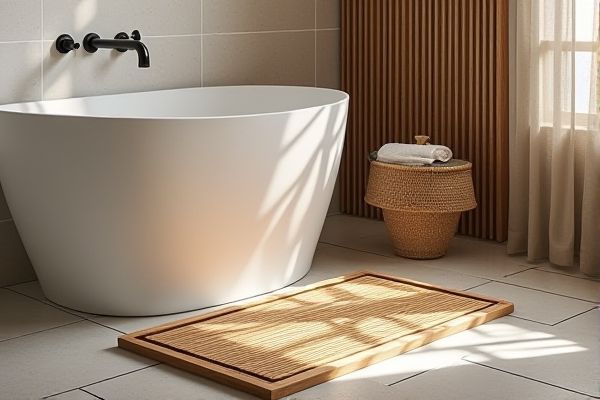
Bamboo bath mats offer natural water resistance and a lightweight design, making them easy to clean and eco-friendly, while teak bath mats provide superior durability and a rich, warm aesthetic due to their dense hardwood properties. Discover which option best suits Your bathroom needs by exploring the full comparison in the rest of the article.
Table of Comparison
| Feature | Bamboo Bath Mat | Teak Bath Mat |
|---|---|---|
| Material | Natural bamboo wood | Durable teak hardwood |
| Water Resistance | Moderate water resistance, quick drying | High water resistance, naturally oily |
| Durability | Good, may crack over time | Excellent, resists warping & cracking |
| Maintenance | Requires regular cleaning and drying | Low maintenance; occasional oiling recommended |
| Eco-friendliness | Highly renewable and sustainable | Sustainably harvested but slower growing |
| Price | Affordable | Higher price point |
| Appearance | Light, natural wood grain | Rich, warm brown tones with grain |
Introduction to Bamboo and Teak Bath Mats
Bamboo bath mats offer a lightweight, eco-friendly alternative with natural water resistance and quick-drying properties, making them ideal for humid environments. Teak bath mats provide exceptional durability and resistance to mold and mildew due to their high oil content, offering a luxurious, long-lasting option for your bathroom. Choosing between bamboo and teak depends on your preference for sustainability, maintenance, and aesthetic appeal.
Material Composition and Sustainability
Bamboo bath mats are crafted from fast-growing grass fibers that offer natural antibacterial properties and biodegradability, making them an eco-friendly choice. Teak bath mats consist of dense hardwood rich in natural oils, providing durability and resistance to water and mold, although teak harvesting requires responsible sourcing to ensure sustainability. Choosing between the two depends on your preference for renewable materials with rapid regeneration or long-lasting, naturally resistant wood.
Aesthetic Appeal and Design Options
Bamboo bath mats offer a natural, light-toned aesthetic with intricate slat designs that enhance minimalist and eco-friendly bathroom decor, while teak bath mats provide rich, warm hues and dense grain patterns that suit luxury and rustic styles. Bamboo's flexibility allows for various patterns, shapes, and sizes, often featuring anti-slip backing, whereas teak's durability supports thicker, heavier mats with ergonomic groove designs for water drainage. Both materials complement modern and traditional interiors but differ in texture and visual warmth, influencing overall bathroom ambiance.
Water Resistance and Absorbency
Bamboo bath mats offer excellent water resistance due to their natural silica content, which helps prevent mold and mildew growth, making them ideal for damp environments. Teak bath mats excel in absorbency as their dense, oily wood fibers naturally repel water while effectively soaking up moisture, ensuring a dry and safe bathroom floor. Both materials provide durable, water-resistant options, but teak's superior oil content grants it a slight edge in long-term moisture management.
Durability and Longevity Comparison
Bamboo bath mats offer impressive durability due to their natural resistance to water and mold, making them a long-lasting option for humid bathroom environments. Teak bath mats provide superior longevity thanks to teak's high oil content, which enhances its resistance to moisture, warping, and decay even in consistently wet conditions. Both materials excel in durability, but teak generally outperforms bamboo in terms of lifespan and resistance to heavy wear and moisture damage.
Maintenance and Cleaning Requirements
Bamboo bath mats require regular wiping and occasional deep cleaning with mild soap to prevent mold and mildew due to their natural moisture absorption. Teak bath mats feature natural oils that resist water and pests, allowing for easier maintenance with simple rinsing and periodic oil treatment to preserve durability. Both materials demand proper drying in well-ventilated areas to extend lifespan and maintain hygiene.
Comfort and Safety Features
Bamboo bath mats offer natural anti-slip properties and quick-drying surfaces, enhancing safety by reducing the risk of mold and mildew buildup. Teak bath mats are prized for their durability and naturally water-resistant hardwood, providing a stable, slip-resistant footing even in wet conditions. Both materials contribute to comfort, but bamboo's softer texture contrasts with teak's firm, sturdy feel underfoot.
Cost and Value for Money
Bamboo bath mats typically cost less than teak bath mats, making them a budget-friendly option for eco-conscious buyers. Teak mats, while more expensive, offer superior durability and natural resistance to moisture and mold, providing long-term value despite the higher initial investment. Choosing between bamboo and teak depends on balancing upfront cost with the desire for prolonged lifespan and premium quality.
Eco-Friendliness and Environmental Impact
Bamboo bath mats are highly eco-friendly due to bamboo's rapid growth rate and renewable nature, requiring minimal water and no pesticides, which significantly reduces their environmental footprint. In contrast, teak bath mats, while durable and naturally resistant to moisture, originate from hardwood trees that take decades to mature, raising concerns about deforestation and habitat loss if not sourced from sustainably managed plantations. Choosing bamboo mats supports sustainable forestry practices and carbon sequestration, making them a greener option for environmentally conscious consumers.
Choosing the Right Bath Mat for Your Bathroom
Bamboo bath mats offer natural antibacterial properties and quick drying times, making them ideal for humid bathrooms prone to mold growth. Teak bath mats provide exceptional durability and water resistance, with rich oils that prevent rot and add a luxurious touch to your bathroom decor. Your choice depends on whether you prioritize eco-friendly materials and lightweight design or long-lasting strength and a premium aesthetic.
 homyna.com
homyna.com